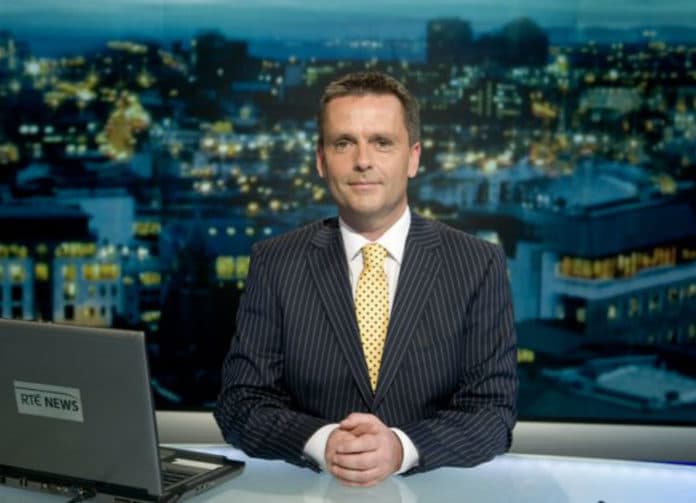Former RTE broadcaster Aengus Mac Grianna spoke to Trinity News today in the Arts Building. Mac Grianna spoke with Trinity News Editor Niamh Lynch in the Swift Theatre, marking the final Freshers’ Week event organised by Trinity News.
Mac Grianna opened his speech by addressing his own career. He pointed out the importance of developing his skills, and recognised that this was made possible by working “under every single desk in the newsroom”. He said that this skill helped him to understand that he was “the last point of call between the viewers and listeners”.
Mac Grianna remarked that in his early career he favoured radio broadcasting, which he found “much simpler”. However, he also noted that it is “more demanding” and “demanded more of your voice”. He pointed out that this was not necessarily the case anymore, with “radio styles beginning to change”.
The audience enjoyed Mac Grianna’s stories of his famous news bloopers, which have become viral in past years. He described an error in pronunciation he suffered in 1989, when listing the name of a doping drug. However, more notably, he acknowledged a viral video from 2013 which showed him fixing his tie while on air. He defended his actions and said that “nobody knew we were on air”.
His address then took a more serious tone as he described the two events which had “the biggest impact” on him as a journalist. These were the Omagh bombings and the announcement of the Troika coming to Ireland. He noted that the bombing was “the only time when I went off air I knew that my eyes were welling up”.
However, Mac Grianna expressed his nervous attitude towards the future of journalism, and said that he has noticed both a “less rigorous adherence to styles” and “less rigorous fact checking”. He noted that this was a consequence of a more fast-paced news environment, which he criticised saying that “everyone wants to be first with that app, that notification”.
He also said that this was a key component of fake news, with sources “then issuing a correction”. According to him this was not sufficient, as most people would not view corrections, and are therefore misinformed. Mac Grianna praised a slower approach to news writing and said that it’s “better to be late with the story and have it right”.
Following Mac Grianna’s discussion, Editor of Trinity News Niamh Lynch opened the floor to questions, asking him what his favorite part of his job was. Mac Grianna remembered that he faced “new challenges all the time”, and met people that he “would never have otherwise come across”. He also said that “live broadcasting was my drug”, which was met by great laughter from the audience.
When asked about representation in the media, he pointed out that “right back to the early 70s RTE has had women broadcasters”. He noted that while coming to the end of his career, he was the “only male newscaster, and that’s not balance”. He stated that the imbalance was within industry pay, which he believes is currently quite unclear and hard to understand.
Mac Grianna noted that as a member of the LGBT+ community, he strives to be confident in himself. He cheerfully noted that he “remembers that I decided that I was going to be me, and sashay my way up the newsroom”. He was optimistic and said that “there is many LGBT people in the newsroom”, and feels it is not considered an issue anymore.
When asked about the importance of balance in news media, he believed that “he was very comfortable with the idea of not giving my own opinion”. However, he said that this belief was challenged during the marriage equality referendum. He knew that “when something really vile was said, and it affected me personally, I could not defend myself”.
When questioned on the importance of accents in broadcast media, he claims that this was not a concern. He believed that a news reader simply needs to remember that “it’s all about whether you speak properly”. He also recognised that while from the north of Dublin, he is constantly met with people stating, “you don’t even speak like a north sider”.
In concluding his discussion, Mac Grianna recognised that “in democracy, everyone has a say”. However, he noted that it was the role of the journalist to “allow the viewer to make up their own opinion”. He criticised the American media, and said that failure to do this has left “America in a state of flux”.






